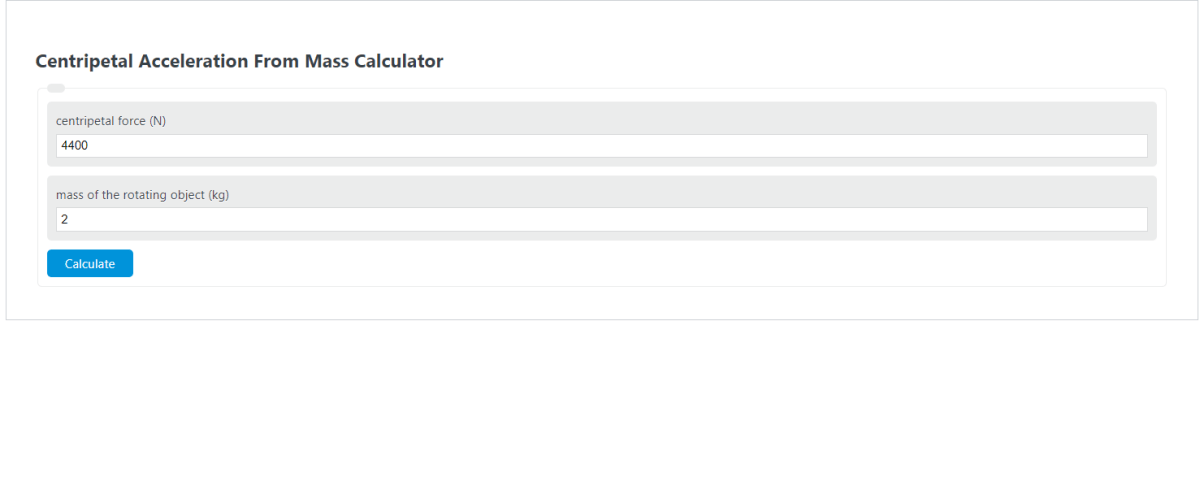Enter the centripetal force and the mass of the rotating object into the calculator to determine the Centripetal Acceleration From Mass.
- All Acceleration Calculators
- Centripetal Acceleration Calculator
- Linear Acceleration to Angular Acceleration Calculator
- Centrifugal Acceleration Calculator
- Centripetal Force Calculator
Centripetal Acceleration From Mass Formula
The following equation is used to calculate the Centripetal Acceleration From Mass.
Ac = Fc / m
- Where Ac is the Centripetal Acceleration From Mass (m/s^2)
- Fc is the centripetal force (N)
- m is the mass of the rotating object (kg)
What are the units for Centripetal Acceleration From Mass?
The most common units for Centripetal Acceleration From Mass are m/s^2.
How to Calculate Centripetal Acceleration From Mass?
Example Problem:
The following example problem outlines the steps and information needed to calculate the Centripetal Acceleration From Mass.
First, determine the centripetal force. In this example, the centripetal force is determined to be 40 (N).
Next, determine the mass of the rotating object. For this problem, the mass of the rotating object is measured to be 2 (kg).
Finally, calculate the Centripetal Acceleration From Mass using the formula above:
Ac = Fc / m
Inserting the values from above and solving the equation with the imputed values gives:
Ac =40 / 2 = 20(m/s^2)
FAQ
What is the difference between centripetal and centrifugal acceleration?
Centripetal acceleration is the acceleration that causes an object to move in a circular path and is directed towards the center around which the object is moving. On the other hand, centrifugal acceleration appears to act on a body moving in a circular path but away from the center, and it is not a real force but a result of inertia from the object’s perspective in a rotating reference frame.
Why is the mass of the rotating object important in calculating centripetal acceleration?
The mass of the rotating object is crucial because it directly influences the amount of centripetal force needed to maintain the circular motion at a certain radius and speed. According to the formula Ac = Fc / m, where Ac is centripetal acceleration, Fc is centripetal force, and m is mass, the acceleration is inversely proportional to the mass. This means that for a given centripetal force, a larger mass will result in a smaller centripetal acceleration.
Can centripetal acceleration change, and what factors affect it?
Yes, centripetal acceleration can change. It is affected by two main factors: the centripetal force applied to the object and the mass of the object itself. According to the formula Ac = Fc / m, increasing the centripetal force or decreasing the mass of the object will result in a higher centripetal acceleration. Conversely, decreasing the centripetal force or increasing the mass will result in lower centripetal acceleration. Additionally, changes in the speed of the object or the radius of the circular path will also affect the centripetal acceleration.
